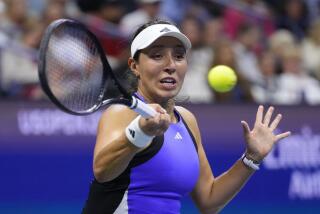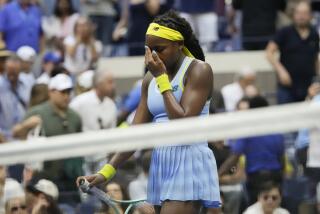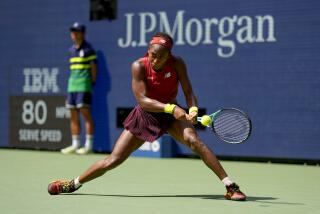Last Call Is Nothing to Toast : Navratilova Wins as Ending Mars Rivalry Redux
- Share via
WIMBLEDON, England — Martina Navratilova and Chris Evert whaled away for most of the afternoon, showing us what women’s tennis has been for the last 15 years.
Evert created angles with her “groundies,” looking to win a war of attrition. Navratilova rushed the net when she dared, putting away crisp volleys when she could.
They have been doing it forever, and probably never better than Thursday, when Navratilova won their semifinal match in the Wimbledon tennis championships, beating her longtime rival, 6-1, 4-6, 7-5.
And then, in the companion semifinal here, 19-year-old Steffi Graf showed us what women’s tennis is about to become.
Before the BBC could muster up a replay of the controversial last point of the Evert-Navratilova match, in which Evert was still standing at the baseline waiting to serve and the umpire was belatedly calling, “Game, set and match,” Graf had beaten Pam Shriver, 6-1, 6-2, in 59 minutes.
Shriver, who has been battling mononucleosis during the tournament, said: “I knew I had to come up with something I didn’t have. For a while out there, I felt very naked.”
Graf, who has already won the Australian and French opens, had been in such a hurry Thursday that she lunged after shots that were obviously out, so impatient was she just to smack a ball. If it moved, she swung. It was another sub-hour match in a Wimbledon reign of terror during which she has lost just 17 games in 6 matches. She has not lost a set in her last 20 matches in Grand Slam tournaments.
So, the old and the new will line up Saturday in a final that will likely provoke a lot of passing-of-the-torch scenarios. Navratilova faced the young West German in the final here last year but didn’t offer her so much as a light, winning in straight sets. Now, Navratilova looks absolutely old-fashioned. What a difference a year makes.
Ivan Lendl will play Boris Becker, and Miloslav Mecir will play Stefan Edberg in the men’s semifinals today, and both matches offer their small intrigues. But neither represents the kind of turning point in tennis that Thursday’s matches did.
“The whole complexion is changing,” admitted Evert, who has ruled this roost three times. Her rivalry with Navratilova, who has ruled it eight, the last six in a row, has kept the game interesting. “You’ve got Steffi (Graf) and Gabriela (Sabatini). It could change from now on.”
Given that prediction, the Evert-Navratilova match may have been one to savor. They’ve done this 78 times now, stretching back to a tournament in Akron, Ohio, 15 years ago.
There was a run between 1982 and 1984 when Navratilova won 13 in a row, but their rivalry otherwise has been a sensational one, two styles entirely different but also entirely competitive. Navratilova has now won 41 of them. More important perhaps, she has won 7 of 9 here at Wimbledon and all 6 finals they have played in.
Thursday’s match was equally as close. Navratilova, 31, raced through the first set, but Evert, 33, timed her rival in the rain-interrupted second set, the passing shots catching a paralyzed Martina at the net.
The third set went back and forth, Evert’s fans becoming more vocal as she continued to hang in, saving a match point in the 10th game with a beautiful forehand passing shot down the line.
With Evert serving, down 5-6 and 0-40 in the final set, she saved two more match points. Then, at 30-40, an odd tableau was staged. If it turns out that this was the last time the two ever meet at the All England Lawn Tennis Club, it was a sorry end, Evert standing on the baseline, thinking it was deuce, and Navratilova walking over to shake her hand, the match evidently over.
What happened was Evert rifled a cross-court shot from deep in her court that clipped the net and settled, or did not, in the doubles alley, just outside the line.
The line judge, David Shepherd, quickly signaled out, but umpire Richard Lumb apparently misunderstood the call and failed to give the final score. Evert assumed that the shot had been in and returned to the baseline to serve.
Navratilova, assuming no such thing, did a double take, saw the call finally and jumped up and down. Then she walked to the net. Evert was somewhat puzzled by what she saw when she turned around.
“I was so sure it was good . . . “ she said. “So happy it was deuce. I was totally unaware it was out, but I looked and saw Martina and I put two and two together.”
She didn’t like what she came up with and made a brief and useless appeal to the umpire. Resignedly, she shook hands with Navratilova.
Navratilova was not saying it was in or out. “Really close,” she allowed. “Too bad, there will always be a little doubt. What can I do?”
And perhaps it would be fitting if their rivalry here ends on an inconclusive note. Ask forever who was the better; this match didn’t provide much of an answer.
“Such push and pull,” Navratilova admitted. “The best passing shots she ever hit against me, better than last year, and that was an incredible match (a semifinal win for Navratilova in three sets). If she comes up with a few more passing shots, she wins. You gotta hand it to her.”
The match, which included a 70-minute rain delay, showcased their talents well enough. Evert sustained incredible rallies, making the court seem 100 yards long with her deep ground strokes.
Navratilova, whose better serve gives her an advantage on the fast grass surface, was kept pinned at her own baseline by those “groundies” and by Evert’s lob, which somehow found fair territory, right inside the line. Occasionally, Navratilova rushed the net, as is her wont, but Evert often passed her. Sometimes not, of course.
The two seem meant for each other, with their contrasting games. But neither may be meant for Graf. If Evert sees a weakness in Navratilova--”Martina’s sort of fragile. I’ve seen her crumble in this kind of match. She appears to be very confident, but I know she’s not.”--you wonder what Graf thinks.
Here’s what she thinks: “They were both quite nervous.”
Navratilova hasn’t struggled only with Evert, her rightful peer. On Wednesday she had difficulty with Ros Fairbank, winning that, 4-6, 6-4, 7-5. Her other wins this tournament were in straight sets, true, but nothing compared to Graf’s scores.
Graf, who hasn’t played Navratilova since the U.S. Open last year, has played every match but one in less than an hour. Only two players got as many as three games off her.
Of Graf, Navratilova remained stubborn in her mean consideration of youth. “She won’t be passing as well as Chrissie did,” she said.
But this may be wishful, and wrong-headed, thinking. Graf now puts such pace on the ball--and she reaches everything--that Navratilova may wish for something as tame as a passing shot.
Against Shriver Thursday, Graf was offered an easy lob, Shriver, completely out of the picture, surrendering the court. Another player might have just tapped the winner into the far court, but Graf hit it with her considerable might, not even thinking about it.
Tune in for the torch passing.
More to Read
Go beyond the scoreboard
Get the latest on L.A.'s teams in the daily Sports Report newsletter.
You may occasionally receive promotional content from the Los Angeles Times.










